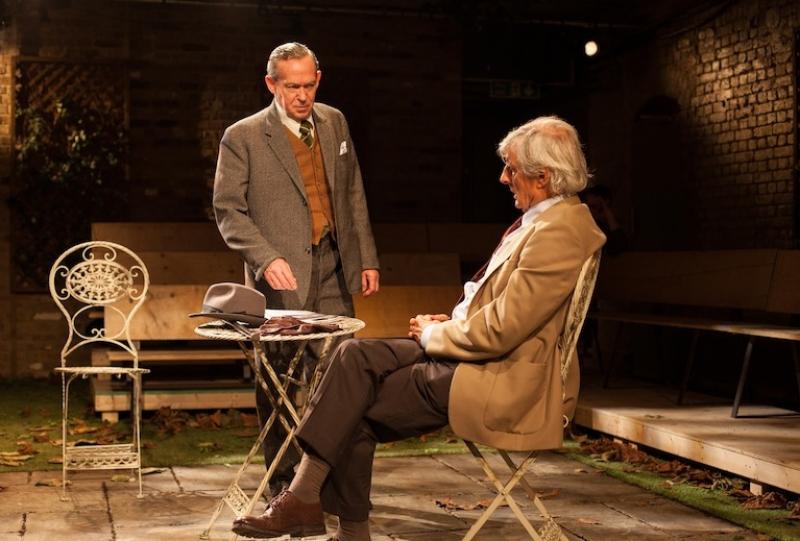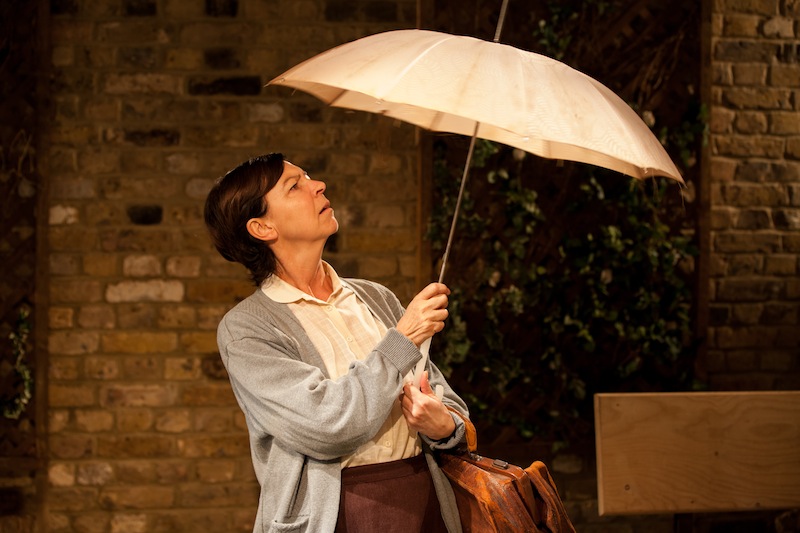Home, Arcola Theatre | reviews, news & interviews
Home, Arcola Theatre
Home, Arcola Theatre
Playwright David Storey's portait of English oddballs enjoys a notable Off-West End revival

This is a strange one. Precious little happens and, in some ways, little is said in David Storey's muted chamber play from 1970. Two men named Harry and Jack – getting on in years, but keeping up appearances in jackets and ties – linger on a patio that's skirted by grass and strewn with autumn leaves. The sun is shining softly. Low-level birdsong is just audible in Amelia Sears's strongly cast production, staged in-the-round in the Arcola's intimate studio space.
The men make disconnected small talk that is mildly comical and unsettling. Speaking of the passing clouds, the duo drift conversationally on to what they did (or didn't do) in the war; how the best musicians have curly hair; their first- and second-hand knowledge of falling off cliffs; religious faith; memories of their parents; where Harry got his leather gloves. We glean they are residents in some kind of mental health institution, not just an old age pensioners' nursing home.
Giving a particularly touching performance, Shepherd has a humorous twinkle in his eye
Paul Copley's Jack mentions that his wife, who has paid a visit, is more delicate than she looks. Mostly he seems affable and well-meaning, pulling a magic trick from up his sleeve, telling Harry (Jack Shepherd)to pick a card. Just occasionally, his eyes freeze over with a look of dark hatred, suspicion or icy competiveness – seemingly out of the blue.
Giving a particularly touching performance, Shepherd has a humorous twinkle in his eye. He's very good on the detailed naturalism of tiny twitches and of long limbs folding shyly around each other. His Jack seems like a sweet gent, politely concurring yet uncomfortable. He is also unexpectedly agonised underneath.
For a while, I wavered between finding the meandering chat refreshingly anti-dramatic and a mite dull – as well as slighty mannered in its broken sentences. Yet it exerts a quiet hold, bringing to mind other works as diverse as Beckett's Godot, Pinter, Peter Gill or David Mamet, Michael Wall’s play Women Laughing (from 1989) or Gérard Sibleyras’ Heroes (translated by Tom Stoppard for the West End in 2005).
The pair of lower-class women whom Jack and Harry later try to court seem, at first, somewhat crudely drawn: cruelly mocking and sexually coarse. However, Linda Broughton's Kathleen wants company for all her cackling laughter, and Tessa Peake-Jones's Marjorie (pictured below) is unnerving, with a glimmer of tenderness under a baleful coldness.
Sears’s production is, in fact, beautifully paced. The fifth character, belatedly entering the frame, is a young man called Arthur, who brandishes the garden furniture over his head like a rampaging psycho. This is intensely weird. It’s also suprisingly poignant as well funny and hair-raising. Joseph Arkley plays Arthur with quivering grief and rage, and a possibly lobotomized, blank stare. Ultimately, we are left with a sense that all these lonely souls are, in some allegorical way, Englishness incarnate – or Englishness of a certain era. The final image is of Storey’s men trying to keep a stiff upper lip but silently weeping.
I suspect this play, though not obviously gripping, may linger in the mind longer than one might expect.
Follow Kate Bassett on Twitter
rating
Share this article
The future of Arts Journalism
You can stop theartsdesk.com closing!
We urgently need financing to survive. Our fundraising drive has thus far raised £49,000 but we need to reach £100,000 or we will be forced to close. Please contribute here: https://gofund.me/c3f6033d
And if you can forward this information to anyone who might assist, we’d be grateful.

Subscribe to theartsdesk.com
Thank you for continuing to read our work on theartsdesk.com. For unlimited access to every article in its entirety, including our archive of more than 15,000 pieces, we're asking for £5 per month or £40 per year. We feel it's a very good deal, and hope you do too.
To take a subscription now simply click here.
And if you're looking for that extra gift for a friend or family member, why not treat them to a theartsdesk.com gift subscription?
more Theatre
 Ragdoll, Jermyn Street Theatre review - compelling and emotionally truthful
Katherine Moar returns with a Patty Hearst-inspired follow up to her debut hit 'Farm Hall'
Ragdoll, Jermyn Street Theatre review - compelling and emotionally truthful
Katherine Moar returns with a Patty Hearst-inspired follow up to her debut hit 'Farm Hall'
 Troilus and Cressida, Globe Theatre review - a 'problem play' with added problems
Raucous and carnivalesque, but also ugly and incomprehensible
Troilus and Cressida, Globe Theatre review - a 'problem play' with added problems
Raucous and carnivalesque, but also ugly and incomprehensible
 Clarkston, Trafalgar Theatre review - two lads on a road to nowhere
Netflix star, Joe Locke, is the selling point of a production that needs one
Clarkston, Trafalgar Theatre review - two lads on a road to nowhere
Netflix star, Joe Locke, is the selling point of a production that needs one
 Ghost Stories, Peacock Theatre review - spirited staging but short on scares
Impressive spectacle saves an ageing show in an unsuitable venue
Ghost Stories, Peacock Theatre review - spirited staging but short on scares
Impressive spectacle saves an ageing show in an unsuitable venue
 Hamlet, National Theatre review - turning tragedy to comedy is no joke
Hiran Abeyeskera’s childlike prince falls flat in a mixed production
Hamlet, National Theatre review - turning tragedy to comedy is no joke
Hiran Abeyeskera’s childlike prince falls flat in a mixed production
 Rohtko, Barbican review - postmodern meditation on fake and authentic art is less than the sum of its parts
Łukasz Twarkowski's production dazzles without illuminating
Rohtko, Barbican review - postmodern meditation on fake and authentic art is less than the sum of its parts
Łukasz Twarkowski's production dazzles without illuminating
 Lee, Park Theatre review - Lee Krasner looks back on her life as an artist
Informative and interesting, the play's format limits its potential
Lee, Park Theatre review - Lee Krasner looks back on her life as an artist
Informative and interesting, the play's format limits its potential
 Measure for Measure, RSC, Stratford review - 'problem play' has no problem with relevance
Shakespeare, in this adaptation, is at his most perceptive
Measure for Measure, RSC, Stratford review - 'problem play' has no problem with relevance
Shakespeare, in this adaptation, is at his most perceptive
 The Importance of Being Earnest, Noël Coward Theatre review - dazzling and delightful queer fest
West End transfer of National Theatre hit stars Stephen Fry and Olly Alexander
The Importance of Being Earnest, Noël Coward Theatre review - dazzling and delightful queer fest
West End transfer of National Theatre hit stars Stephen Fry and Olly Alexander
 Get Down Tonight, Charing Cross Theatre review - glitz and hits from the 70s
If you love the songs of KC and the Sunshine Band, Please Do Go!
Get Down Tonight, Charing Cross Theatre review - glitz and hits from the 70s
If you love the songs of KC and the Sunshine Band, Please Do Go!
 Punch, Apollo Theatre review - powerful play about the strength of redemption
James Graham's play transfixes the audience at every stage
Punch, Apollo Theatre review - powerful play about the strength of redemption
James Graham's play transfixes the audience at every stage
 The Billionaire Inside Your Head, Hampstead Theatre review - a map of a man with OCD
Will Lord's promising debut burdens a fine cast with too much dialogue
The Billionaire Inside Your Head, Hampstead Theatre review - a map of a man with OCD
Will Lord's promising debut burdens a fine cast with too much dialogue

Add comment